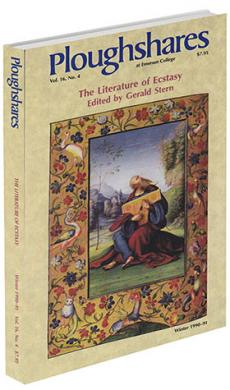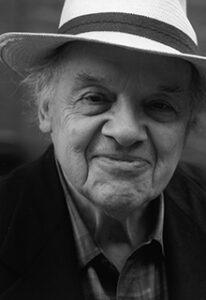rev. of Let Evening Come by Jane Kenyon
Jane Kenyon's third book of poems is deceptively quiet, gorgeously written, fierce and lyrical, stuffed with the luminous details of the ordinary world. It's a book struggling for vision and written out of deep necessity, and so it's hard to quote from — the poems make up a whole cloth. But passionate spiritual inquiry is one of the shining threads. Listen to "Looking at Stars": "The God of curved space, the dry / God is not going to help us, but the son / whose blood spattered / the hem of his mother's robe."
Kenyon looks hard at the hem — the crucial everyday losses and reprieves — and often it's the mud-spattered, snow-dirty hem of a woman's coat as she walks her dog along a country road. I'm crazy about the dog that shows up in some of these poems. Bounding ahead, cocking his leg on a gravestone, he's the foil to the woman walking slowly behind him. If there's often unflinching gravity in these poems, the dog, trembling with obedience and love, "if it is love," is the soul of wit and bodily life. The unreflecting instinctual animal and the meditating woman who hooks and unhooks him to his leash make up a kind of protagonist in the book.
If the dog — the "designated optimist — imagines to the end that he is free," he is also the one "who lay / on the deep pile of dung, / lifting his head and ears / when after twenty years / Odysseus approached him." He is the body that will not resist its attachments. But it's the woman's ability to imagine and remember that allows her to embrace what the body alone cannot tolerate, evident in the hardwon acceptance of the moving title poems.
"Searching for God is the first thing and the last," Kenyon writes, "but in between such trouble, and such pain". . . and there
is sorrow in this book, and sharp moments of joy, and a precise rendering of the world itself that redeems what bewilderment we're in by the love and talent it takes to say it straight out.
Let Evening Come troubles and nourishes. I go back to it, again and again.

